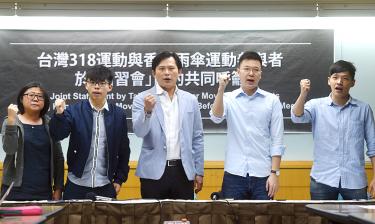Taiwanese and Hong Kong democracy activists yesterday called for the immediate release of human rights advocate Lee Ming-che (李明哲), who has been detained incommunicado in China for two weeks.
Lee, an instructor at Wenshan Community College and a former Democratic Progressive Party employee, “disappeared” after his arrival in China from Macau on March 19. The Chinese government only announced 10 days later that Lee had been detained for engaging in “activities endangering national security.”
New Power Party Executive Chairman Huang Kuo-chang (黃國昌), Hong Kong democracy activist Joshua Wong (黃之鋒) and former Sunflower movement leaders Lin Fei-fan (林飛帆) and Chen Wei-ting (陳為廷) took part in a Taipei news conference where they condemned Lee’s detention and urged other nations, especially the US, to pay closer attention to China’s human rights violations.
Their appeal came ahead of Chinese President Xi Jinping’s (習近平) scheduled meeting on Thursday with US President Donald Trump.
China under Xi has stepped up its suppression of rights activists over the past five years, Wong said, reminding reporters that he been stopped from entering Thailand in October last year, when he had been due to speak in Bangkok, and was detained for 12 hours before being sent back to Hong Kong.
Wong blamed Chinese pressure for the incident.
Wong said that Lee’s detention and the Trump-Xi meeting were behind his decision to call yesterday’s news conference, because he fears that human rights issues might be pushed aside in the trade-focused talks.
“As a long-term supporter of human rights and democracy, the US should not compromise those values in exchange for trade opportunities,” Huang said.
A Chinese law on foreign non-governmental organizations (NGOs), which limits the activities of such groups in China, exposes international human rights activists to the risk of being detained in China the way that Lee has been, the lawmaker said.
“It is understandable why Lee’s wife, Lee Ching-yu (李淨瑜), decided not to employ a lawyer to rescue her husband since the detention could be a means of political suppression and the judicial process in China is of an ‘ornamental nature,’” Huang said.
“We have seen the helplessness of the Lee family against China’s authoritarian government. In addition to NGOs, our government has to provide staunch support for Lee Ching-yu,” Huang said.
The NPP lawmaker was sharply critical of the Straits Exchange Foundation amid reports that it had denied a request from Lee Ming-che’s family to deliver his blood pressure medication to him.
The foundation should be abolished if it could not even attend the basic medical needs of a Taiwanese held in China, Huang said.
“The Lee Ming-che case is a touchstone of Beijing’s attitude toward [NGO] activities in China ahead of the Trump-Xi talks. It is yet to be seen whether China will continue to suppress such activities,” Lin said. “The US cannot excuse itself from China’s human rights violations if it wants to reassure its allies in the Asia-Pacific region.”
There has been no word from Beijing on the charges against Lee Ming-che and it has also refused to disclose his whereabouts, something that should concern activists worldwide, Lin said.
The Sunflower movement in 2014 prevented a cross-strait trade in services agreement from being approved without due legislative process, and the current government was elected on the back of a newly formed public consensus about China, “but what does that prove when there is still a Taiwanese being held in China?” Chen said.
The detention of Lee Ming-che is not an isolated incident and Xi’s suppression of rights activists is being rigorously carried out, with participants and supporters of Hong Kong’s Umbrella movement in 2014 facing prosecution and likely prison sentences, Chen said.
US Secretary of State Rex Tillerson’s comment that the US and China would pursue relations on the principles of “non-conflict, non-confrontation, mutual respect and win-win cooperation” used rhetoric akin to that of the Chinese Communist Party, Chen said.
Many fear that the US might allow China to retain its “core interests” of Tibet, Hong Kong and Taiwan, he said.
Huang, Wong, Lin and Chen asked Beijing to disclose Lee Ming-che’s whereabouts and ensure his rights to visitation, medical care and legal assistance.
Source: Taipei Times - 2017/04/03





















